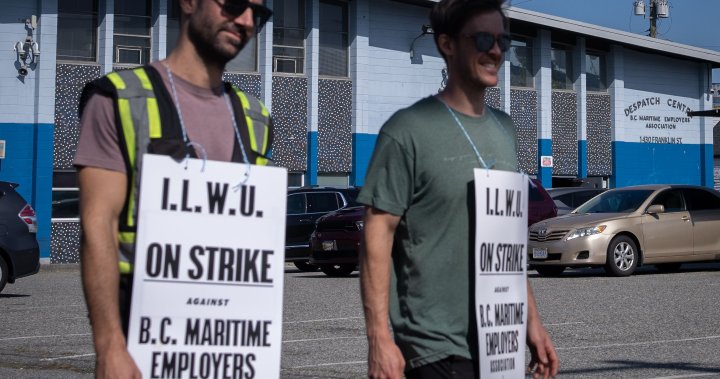Over the Canada Day long weekend, while some Canadians were enjoying fireworks and spending time with friends, longshoremen at several of British Columbia’s busiest ports were going on strike. This strike, involving over 7,000 cargo loaders at around 30 ports, has now entered its fourth day. The impact of the strike is significant, as approximately 25% of Canada’s imports and exports pass through the Port of Vancouver and other west coast marine gateways. Experts warn that a prolonged strike could cause major damage to the economy.
Negotiations between the BC Maritime Employers Association (BCMEA) and the International Longshore and Warehouse Union Canada (ILWU) are ongoing, with workers seeking better pay, job security, and protection against contracted-out labor. However, recent developments suggest that talks have hit a roadblock. The BCMEA no longer believes a deal can be reached at the bargaining table, accusing the ILWU of being inflexible and making unreasonable compensation demands. On the other hand, the ILWU argues that the employers are negotiating in bad faith and that workers should benefit from the record-high profits generated by the ports.
There is speculation about whether the government will intervene and legislate the striking longshoremen back to work. UBC Sauder School of Business professor, Werner Antweiler, believes that given the potential economic impact of the strike and the piling up of shipping containers at the ports, the federal and provincial governments are unlikely to wait more than two weeks before taking action. However, Parliament needs to be recalled to table any legislation in this regard.
Labour Minister Seamus O’Regan Jr. and federal mediators are present in Vancouver to aid in the negotiations. O’Regan emphasizes the importance of reaching a deal at the bargaining table, stating that the best deals are reached through direct negotiations. Small businesses and consumers are concerned about the impact of supply chain disruptions and urge the government to introduce legislation to maintain port activities during a strike, citing potential cost increases.
In conclusion, the strike at British Columbia’s ports is causing significant disruptions to trade and could have a major impact on the economy. Negotiations between the BCMEA and ILWU have faced obstacles, raising questions about whether the government will intervene. The focus remains on reaching a deal through negotiations, with the aim of minimizing disruptions to the supply chain and protecting the interests of businesses and consumers.
Denial of responsibility! VigourTimes is an automatic aggregator of Global media. In each content, the hyperlink to the primary source is specified. All trademarks belong to their rightful owners, and all materials to their authors. For any complaint, please reach us at – [email protected]. We will take necessary action within 24 hours.


